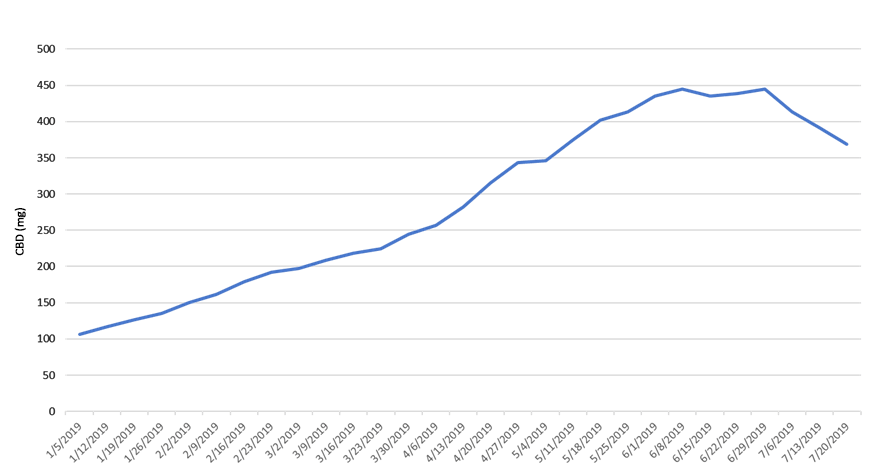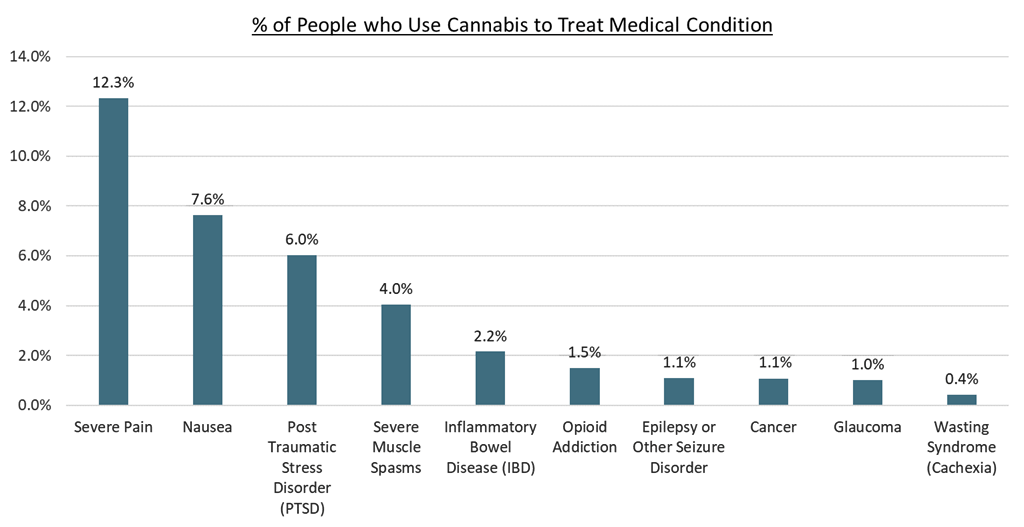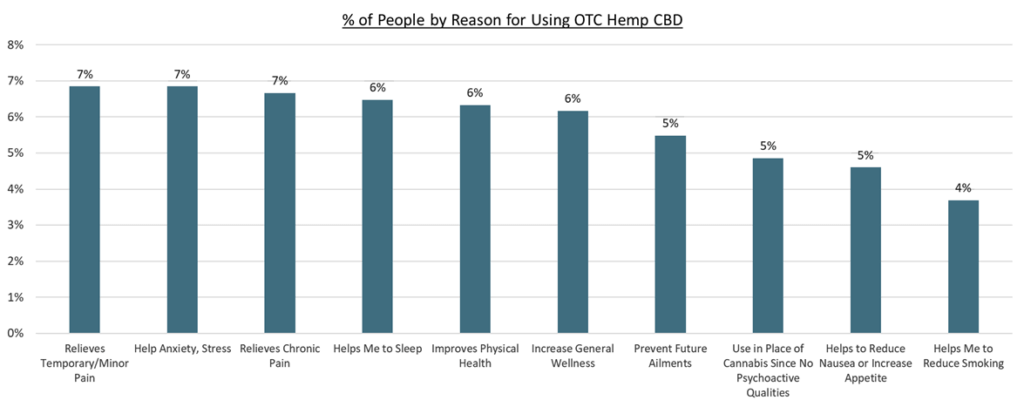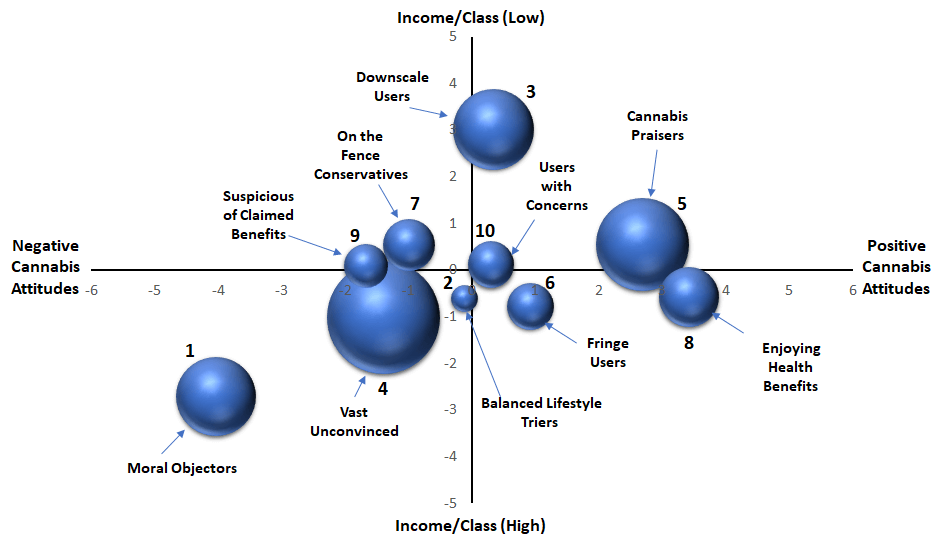By Stephen J. Gongaware, Sr. Vice President of Business Development at Management Science Associates, Inc. (MSA)
Hemp CBD became the fastest growing CPG product in 2019, following its legalization in the Farm Bill of December 2018. Consumers show great interest in its use for wellness, health & beauty applications and for pets. Its many distribution channels require integrating convenience store and shipment data not required for most dispensary products.
In U.S. Convenience Stores, total sales of CBD have increased 168% in the first half of 2019 while average weekly dollar sales increased by 235%.
The higher revenue growth accompanied CBD content per package increasing from 100mg on January 5, 2019 steadily to over 350mg on July 20, 2019, after having peaked briefly in June 2019 near 450mg per unit. See graph below.
Mg CBD per SKU at Retail

Medical Conditions Treated with Cannabis
Pain relief is the major reason cited as a medical condition for cannabis use, followed by nausea, PTSD, muscle spasms, IBD and opioid addiction as seen in the following table:

Cannabis and Opioid Use Disorder
Of particular note is the growing number of consumers using Cannabis to treat Opioid Use Disorder (OUD). As of August 2019, seven states have approved medical cannabis for treating OUD: PA, NY, NJ, NM, MO, IL & CO. Twenty-one studies (2009-19) show the effect of cannabis on helping opioid users to reduce or eliminate the use of opioids to treat pain. NFL professional athletes have withdrawn from using opioids after they retire, with the aid of CBD and/or adult cannabis.
Consumer Purchase Drivers of OTC Hemp CBD
The top consumer drivers of OTC Hemp CBD are pain relief, reducing anxiety and helping sleep, as shown in the following graph.

Cannabis Product Composition and Patient Outcomes
Over the past several years, advances in technology have greatly enhanced the prospects for cannabis growers, processors, and dispensaries to provide medical cannabis products to patients that efficaciously treat the medical conditions and alleviate the incapacitating symptoms that they suffer.
Pre-clinical scientific research is determining the physiological effects of individual cannabinoids and terpenes on specific medical conditions and symptoms. Mobile apps are enabling the systematic querying of patients about the efficacy of specific cannabis strains and products in alleviating symptoms and conditions.
Collectively, these advances and other medical research are creating volumes of evidence to which human and artificial intelligence will be applied to develop insights for use by patients and medical researchers, growers, and processors in formulating products creating newer therapeutic options. Patients are already making informed decisions that improve individualized treatment of medical conditions progressively over time due to CBD being an approved over-the-counter consumer product.
Advanced Consumer and Patient Targeting to Improve Marketing and Medical Outcomes
Consumer attitudes, perceptions, and usage in local markets create richer, more actionable insights from customer segments, creating advanced quality scores and indices for scoring first-party internal data.
Cannabis consumer data is used for strategic and tactical product development, applications including:
- Market Architecture: differentiating dimensions of product form and brand choice
- Key Reasons for Use and Purchase
- Affinity with Media, Channel, and other Product Categories
Multiple correspondence analysis of hundreds of consumer survey category questions is used to understand dimensional distinctions and differences between clusters. These key spatial dimensions for segmentation illuminate key differentiators, for use in innovation/new products, brand strategy, marketing execution, and digital media tactics.

Create Target Profiles
Merging cannabis consumer data with general consumer data such as Financial, Healthcare, Restaurants, Grocery/Drug Stores, and Media usage & exposure for each respondent facilitates creation of new consumer segments.
Using zip code identified respondent level data, the above Target Profile clusters can be integrated with other market and first–party data to prioritize personalization, enhance brand positioning, inform messaging, new customer marketing & acquisition efforts, and multi-touch attribution databases.
 Mr. Stephen J. Gongaware is Sr. Vice President of Business Development at MSA (Management Science Associates, Inc.), a privately held diverse information technology development and service firm that for over 50 years has provided innovative solutions within its three core competencies of analysis, technology and data management. He has played a major role in developing and managing several MSA businesses in addition to his focus since 2014 on the medical value of cannabis for prospective patients, beginning with CBD and 20 other nonpsychedelic cannabinoids then measured by leading edge test labs. Other businesses he’s created and managed at MSA in the last 20 years includes services to develop/market pharma “rare disease” solutions, and MSA Casino Gaming solutions improving operation of slot floors, player satisfaction and also lead smart phone and sports book innovative projects with 6 of the Top 10 global casino operators and with several major gaming equipment manufacturers.
Mr. Stephen J. Gongaware is Sr. Vice President of Business Development at MSA (Management Science Associates, Inc.), a privately held diverse information technology development and service firm that for over 50 years has provided innovative solutions within its three core competencies of analysis, technology and data management. He has played a major role in developing and managing several MSA businesses in addition to his focus since 2014 on the medical value of cannabis for prospective patients, beginning with CBD and 20 other nonpsychedelic cannabinoids then measured by leading edge test labs. Other businesses he’s created and managed at MSA in the last 20 years includes services to develop/market pharma “rare disease” solutions, and MSA Casino Gaming solutions improving operation of slot floors, player satisfaction and also lead smart phone and sports book innovative projects with 6 of the Top 10 global casino operators and with several major gaming equipment manufacturers.
Prior to joining MSA, Mr. Gongaware was CEO of NetworkNext, an innovative national advertising firm; R&D Director at Cellomics, Inc. where he was awarded US Patent #US6365367; and an Electrical Engineer at Westinghouse Electric Corp. He received his BSEE degree from University of Pittsburgh in 1992 and his MBA from its Katz School of Business in 1995.
MSA is an Analytics firm with Big Data integration capability incorporated in 1963 to focus on improving government and management decisions. MSA has 800+ professionals with expertise in data science & AI, software development, test marketing, data management and management consulting and many of its innovations have become industry-standard solutions. MSA has served over 70 Fortune 500 Customers/Clients in the CPG, Media, Metals, Life Sciences & Pharma, and Casino Gaming & Sports Betting industries. It has been engaged in cannabis research since 2013 with the goal of providing the cannabis industry similar services to what has been now provided to the CPG, Steel, Tobacco, Casino Gaming, and Pharma industries for more than 50 years.


Follow NCIA
Newsletter
Facebook
Twitter
LinkedIn
Instagram
–